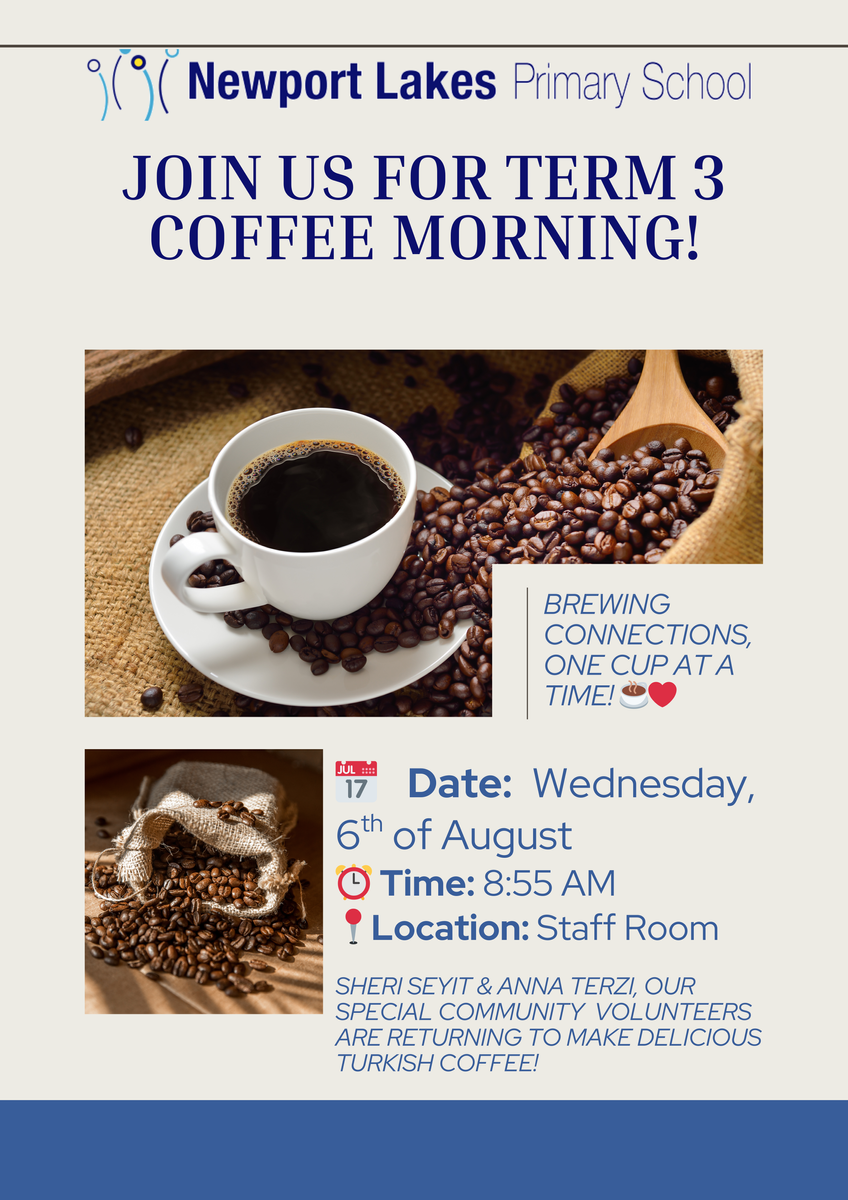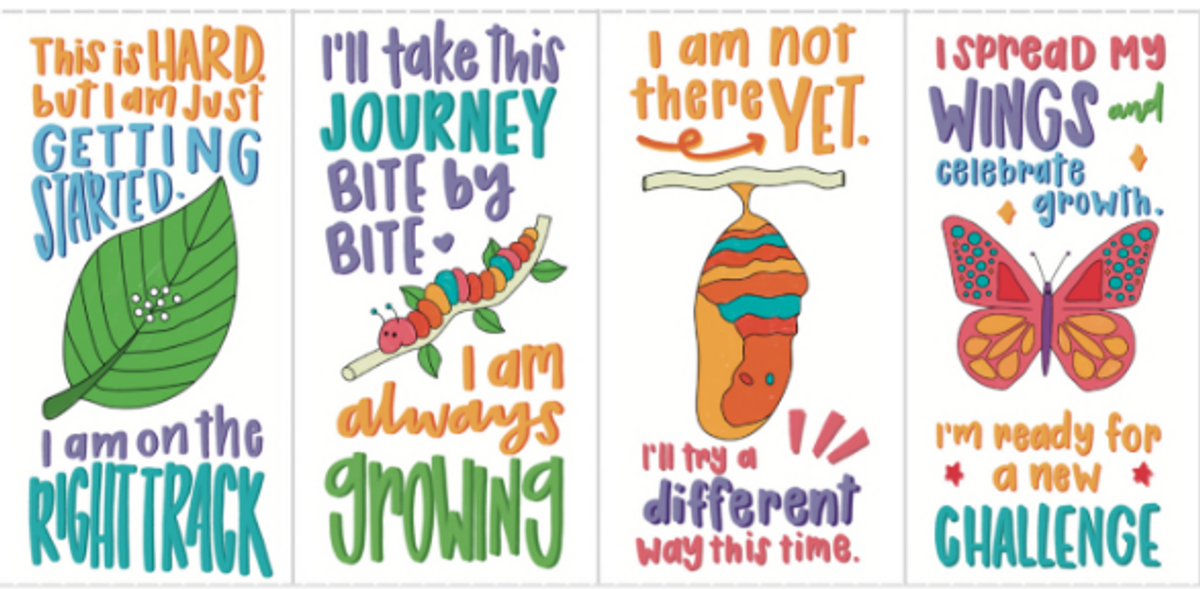Health & Wellbeing @ NLPS

Coffee Morning Catch-Up
Held once each term, these relaxed gatherings are a wonderful opportunity to connect with fellow parents, carers, and staff, over a cup of coffee or tea.
📅 Date: Wednesday 6th August
⏰ Time: 8:55 AM
📍 Location: Staffroom
We’re especially lucky to have Sheri Seyit, our special community volunteer, returning to make her delicious Turkish coffee once again. Whether you’re new to the school or a familiar face, we’d love for you to join us for a chat and a chance to build our school community together.
We look forward to seeing you there!
Proudly supporting Bullying No Way: National Week of Action
Once again, this year Newport Lakes Primary School will be participating in the Bullying No Way: National week of action, 11th to 15th August 2025.
Bullying No Way Week is a commitment being made by thousands of schools and supporters across the country. It provides an opportunity to demonstrate our commitment to bullying prevention. It gives us an opportunity to connect with students, staff and school communities to implement workable solutions to prevent bullying.
The theme for this year's campaign is Be Bold. Be Kind. Speak Up.
It takes a community to be brave and address bullying behaviours, within and beyond the school gate.
Students can be bold, kind and speak up to support others being bullied, while trusted adults are there to support children learn how to be kind to each other and report bullying. This Bullying No Way Week, we’re asking children to be bold and say something, be kind and support someone, and be proud to speak up against bullying.
During the week we will be engaging students in meaningful discussions and activities aimed at promoting empathy, understanding, and respect for diversity. We encourage families to take this opportunity to have open and honest conversations with your child about the impact of bullying and what they can do if they need support.
For more information about Bullying No Way Week and bullying prevention, visit: https://bullyingnoway.gov.au/support-and-advice/for-families
Bullying Definition:
Bullying is an ongoing and deliberate misuse of power in relationships through repeated verbal, physical and/or social behaviour that intends to cause physical, social and/or psychological harm. It can involve an individual or a group misusing their power, or perceived power, over one or more persons who feel unable to stop it from happening. Bullying can happen in person or online, via various digital platforms and devices and it can be obvious (overt) or hidden (covert). Bullying behaviour is repeated, or has the potential to be repeated, over time (for example, through sharing of digital records). Bullying of any form or for any reason can have immediate, medium and long-term effects on those involved, including bystanders. Single incidents and conflict or fights between equals, whether in person or online, are not defined as bullying.
The Power of 'Not Yet': Helping Our Children Grow Through Struggle
As parents and educators, it’s natural to want to build up our children’s confidence, especially when they’re finding something difficult. Many of us have said things like, “You’re amazing at this!” or “You’re such a good reader!” in an effort to encourage a child who’s struggling.
What if our encouragement is focusing more on achievement than the learning journey itself?
Research on growth mindset, a term coined by psychologist Carol Dweck, shows that praising children for being 'good' at something can actually lead them to avoid challenges. They may begin to associate their worth with success, and fear situations where they might fail.
Instead of focusing on being good at something, we can shift our language to praise effort, persistence, and the process of learning. When a child hears, “It’s okay to not understand this yet. I see how hard you’re trying,” we’re telling them that struggle is normal, and growth takes time. It fosters resilience, builds intrinsic motivation, and helps them become lifelong learners.
Here are a few simple ways to encourage a growth mindset at home and school:
- Replace “You’re so smart” with “You worked so hard on that.” This helps children value effort over innate ability.
- Celebrate mistakes as learning opportunities. Saying things like “That was tricky, what do you think you learned from it?” teaches children that getting it wrong is part of the journey.
- Use the word “yet.” For example, “You haven’t mastered this yet, but I can see you’re improving.” That tiny word holds powerful promise and keeps hope alive.
- Model it yourself. Talk about your own challenges: “I didn’t know how to fix that at first, but I kept trying and figured it out.” Let children see you as a learner too.
- Unpack this visual with your child/ren:
This image is reminder of what a growth mindset looks and sounds like for children. Using the life cycle of a butterfly, it encourages children to embrace challenges, take small steps, and recognise that growth happens over time.
As adults normalising being a beginner is a gift we can give children. When children understand that it’s okay not to be great at everything straight away, they feel safer to try, to stretch, and to grow.
So next time your child is feeling discouraged, instead of rushing to reassure them that they’re already good at it, try this instead: “I can see this is tough. But I also see you’re trying, and that’s what makes you a great learner.”
Let’s continue to build a community where effort is valued, mistakes are part of the process, and “not yet” is something to be proud of 😊
Samantha Meddis
Mental Health and Wellbeing Leader


